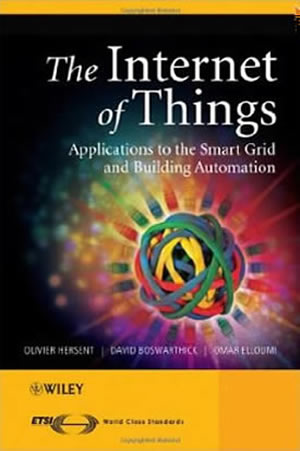 By Olivier Hersent, David Boswarthick, Omar Elloumi
By Olivier Hersent, David Boswarthick, Omar Elloumi
Hardcover: 370 pages
Publisher: Wiley-Blackwell; 2nd Edition edition (6 Jan 2012)
An all–in–one reference to the major Home Area Networking, Building Automation and AMI protocols, including 802.15.4 over radio or PLC, 6LowPAN/RPL, ZigBee 1.0 and Smart Energy 2.0, Zwave, LON, BACNet, KNX, ModBus, mBus, C.12 and DLMS/COSEM, and the new ETSI M2M system level standard.
In–depth coverage of Smart–grid and EV charging use cases. This book describes the Home Area Networking, Building Automation and AMI protocols and their evolution towards open protocols based on IP such as 6LowPAN and ETSI M2M. The authors discuss the approach taken by service providers to interconnect the protocols and solve the challenge of massive scalability of machine–to–machine communication for mission–critical applications, based on the next generation machine–to–machine ETSI M2M architecture.
The authors demonstrate, using the example of the smartgrid use case, how the next generation utilities, by interconnecting and activating our physical environment, will be able to deliver more energy (notably for electric vehicles) with less impact on our natural resources.
Key Features:
Offers a comprehensive overview of major existing M2M and AMI protocols
Covers the system aspects of large scale M2M and smart grid applications
Focuses on system level architecture, interworking, and nationwide use cases
Explores recent emerging technologies: 6LowPAN, ZigBee SE 2.0 and ETSI M2M, and for existing technologies covers recent developments related to interworking
Relates ZigBee to the issue of smartgrid, in the more general context of carrier grade M2M applications
Illustrates the benefits of the smartgrid concept based on real examples, including business cases
This book will be a valuable guide for project managers working on smartgrid, M2M, telecommunications and utility projects, system engineers and developers, networking companies, and home automation companies. It will also be of use to senior academic researchers, students, and policy makers and regulators.













